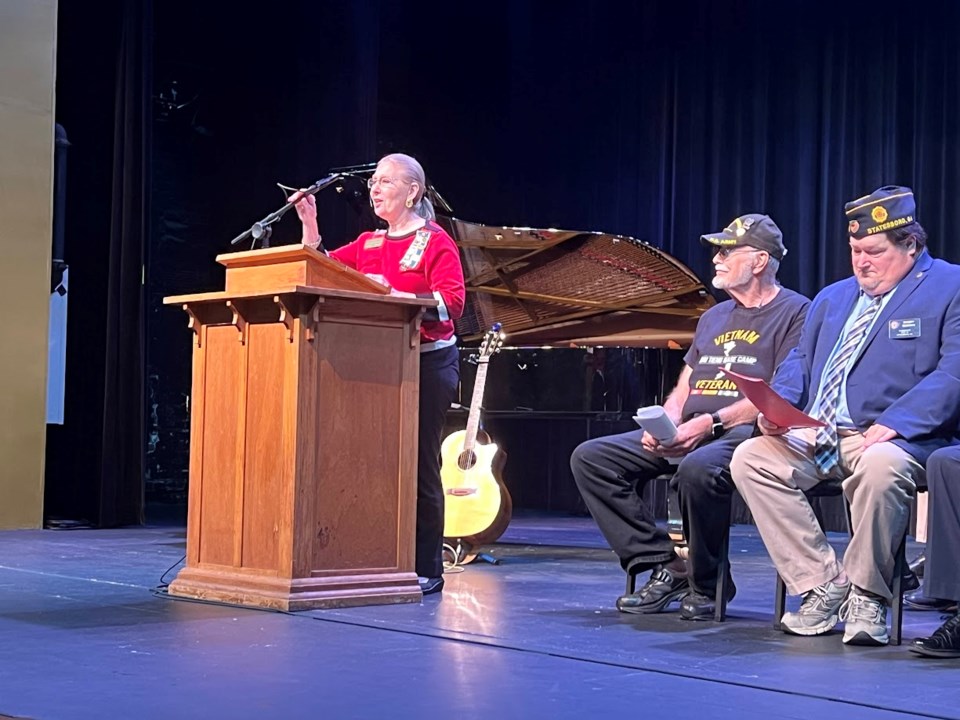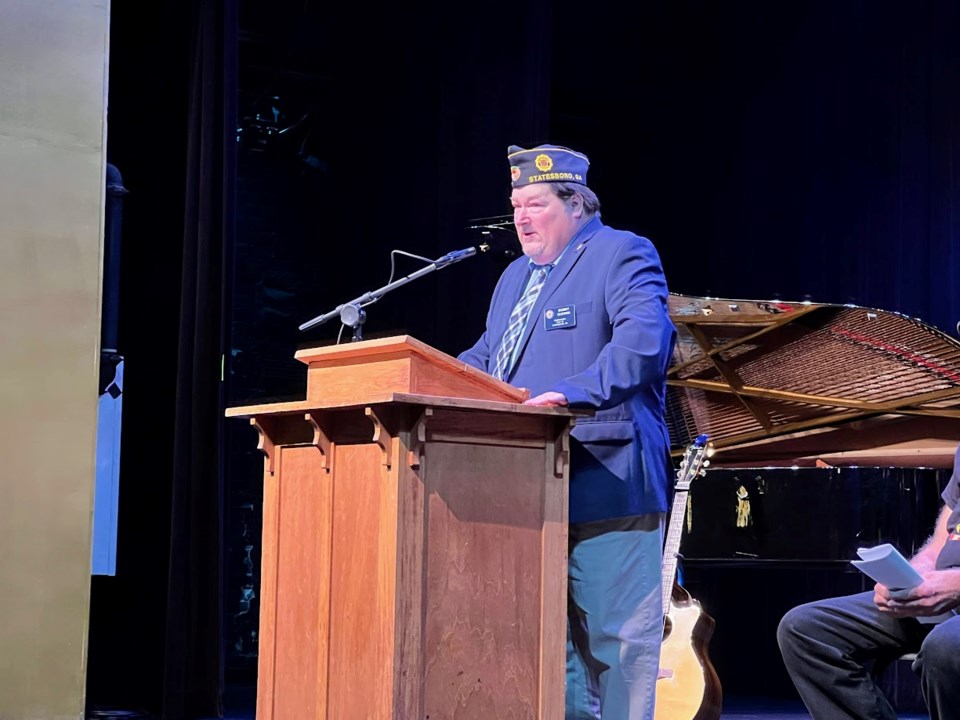As guests waited for the speeches to commence for the annual Veterans Day program, they enjoyed coffee and doughnuts in the main gallery of the Averitt Center, provided by the Daughters of the American Revolution.
Isaac Sherrod performed a number of patriotic songs on the piano as the crowd gathered inside of the Emma Kelly Theater, for the American Legion Dexter Allen Post 90 Veterans Day program.
Post 90 Commander Bobby Godwin began the ceremony asking each of us to remember a few things throughout the day of November 11, 2024:
- Stop and reflect, pause and remember those who have served and sacrificed for our country.
- Listen to the veterans who come from all walks of life.
- Welcome and embrace veterans into the community.
"It is our honor to host everybody here and to thank everybody for their service, again on behalf of my entire staff," said Robert Faller, Director of the Averitt Center.
Post 90 Senior Vice Commander John Daube shared the American Creed, in recognition of the values that each service member makes an oath to defend.
Ken Johnson, Junior Vice Commander of Post 90, shared three moving poems that he wrote at the ages of 19 and 20 while serving in the Vietnam War.
"To honor our veterans. let us salute those who are currently in harms way protecting our freedom," said Earl Anderson, Post 90 Junior Vice Commander. "Honor all our veterans who unselfishly place their lives on the line for our freedom. May God bless our veterans and may God continue to bless the United States of America."
Adjutant for Post 90, Gary Martin continued to express gratitude for all service members, highlighting the hardship and struggles that many of them face during and as a result of their service. The 'Be the One' program is a mission led by the American Legion which aims to help end veteran suicide. The Legion uses their national platform to spread the word of the campaign through a training program that helps enable individuals recognize suicide risk factors for service members. The training developed through a partnership with Columbia university helps to:
- Destigmatize asking for mental health support, creating opportunity for those with mental health issues to speak freely and get the support they need.
- Provide peer-to-peer support and resources in local communities. (See Peer Group Support pages)
- Deploy FDA-approved therapeutics for veterans to identify issues and find resources for support.
Martha Ann Tanner of the Daughters of the American Revolution (DAR) delivered a heartfelt speech honoring veterans. Representing the DAR, a historic organization of women descended from patriots of the Revolutionary War, Tanner spoke on the group’s commitment to education and patriotism, as well as their active support of veterans.

Tanner shared a bit of personal history, recounting the service of her three uncles in World War II, each representing a branch of the military: Air Force, Navy, and Army. She acknowledged that while her family members returned safely, others in the audience might not have been as fortunate, highlighting the many sacrifices made by many families.
In her remarks, Tanner also explained the DAR’s Veterans Committee, established in 1968 to provide consistent support to veterans. Through various activities, the DAR actively recognizes veterans’ contributions and engages in meaningful conversations with those who served.
Encouraging attendees to explore their own potential Revolutionary War lineage, Tanner expressed her pride in her DAR chapter’s dedication to supporting veterans year-round. She emphasized the DAR’s belief in honoring veterans not just on Veterans Day but every day, acknowledging the freedoms preserved through their sacrifices.

Commander Bobby Godwin of the American Legion Dexter Allen Post #90 introduced keynote speaker Chaplain Nick Spletstoser, spotlighting his extensive military background and dedication to veterans' support. Goodwin began by emphasizing the importance of the “Be the One” program, a suicide awareness initiative led through a Columbia University course, which Spletstoser himself conducted for 10 local Legion members and auxiliary participants.
Chaplain Spletstoser, a Lieutenant Colonel and Joint Forces Headquarters Army chaplain with the South Carolina Army National Guard, boasts a decorated military and educational history. His service began in 1992 with the Georgia Army National Guard, where he served as a mechanized infantryman, anti-tank specialist, and later a chaplain. Spletstoser holds a Bachelor’s in Art Education, a Master’s in Divinity, and a Master’s in Community Counseling, marking a comprehensive background in both military and pastoral care.
His career has included roles as an RTO, assault gunner, designated marksman, and team leader. Among his many achievements, Spletstoser has earned notable decorations such as the Defense Meritorious Service Medal, Army Commendation Medal, and the Army Achievement Medal, showcasing his commitment to service and leadership. In addition to his military career, he has served as the Senior Chaplain at Ogeechee Area Hospice for over a decade, where he provides grief counseling, pastoral care, and leads the We Honor Veterans program.
Spletstoser’s dedication to serving others extends into the community, where he teaches Taekwondo as a fourth-degree black belt. A Statesboro resident, he and his wife, Deanna, have been married for over 20 years and share three daughters.
Chaplain Spletstoser shared a moving account of his life, his calling, and his profound respect for veterans. Growing up in a family with a strong military legacy, Spletstoser’s grandfather and father both served in the Navy, while his brother, niece, and other relatives have continued that tradition across the armed forces. Initially, Spletstoser himself had aspirations of becoming a "super soldier," imagining a life of military heroics after growing up on the 80's action film stars. But, as he explained, his path took a different direction. Feeling a deep sense of calling, he ultimately joined the Army as a chaplain, realizing that his true purpose lay in supporting soldiers’ spiritual needs rather than wielding weapons. His calling required a transformation, one that shifted his focus from external heroics to being a “worker” for God, using faith as his guide in some of the darkest situations service members face. This journey was deeply personal for him, grounded in a faith he described as essential as the air he breathes.
In his speech, Spletstoser shared that the military chaplaincy has a long-standing history dating back to 1775, when George Washington recognized the importance of tending to soldiers' spirits amidst the horrors of war. From that time onward, chaplains have served to protect soldiers' First Amendment rights and to be compassionate figures in times of struggle. He recounted the story of the “Four Immortal Chaplains,” who gave their life jackets to others as their ship sank during WWII, uniting in prayer across different faiths.
Chaplains, he explained, play a unique role in the military, bringing light into dark places, whether that’s on the battlefield, during natural disasters, or in the face of moral and ethical dilemmas. His own experiences as a chaplain have underscored the weight of this role. From celebrating joyous milestones like births and weddings to helping soldiers navigate grief, PTSD, and moral injury, he has provided steady support to those in need. At times, he has been the first to hear a veteran's untold story, offering a safe space for those memories to surface and helping ease burdens carried for decades.
Through his work at Ogeechee Area Hospice, Spletstoser has seen the lasting impact of his presence, knowing that sometimes, simply sitting in silence can be the most profound form of comfort.
Spletstoser’s speech also reflected three key principles he holds as a chaplain: making faith his personal priority, being ready to share the hope his faith brings, and treating others with compassion and respect, no matter their beliefs. These tenets have guided him in supporting soldiers across all backgrounds, helping them find strength when they feel lost. To close, Spletstoser urged everyone to be a light in others’ darkness, a reminder that we all have a role in sharing hope and freedom. Reflecting on the often-overlooked contributions of women veterans, he performed an original song he wrote, honoring their service and sacrifice. The speech resonated with the audience, bringing everyone together in a shared sense of gratitude and remembrance for those who have served.
To end the program, Chaplin Skarhus lead the room in a closing prayer, and Senior Vice Commander Daube lead the audience in singing "God Bless America" together.
View the live video below
Grice Connect live streamed the annual program. You can watch it here.




